Conflict Zones
India-Pakistan tensions continue to simmer across Kashmir border | Conflict News
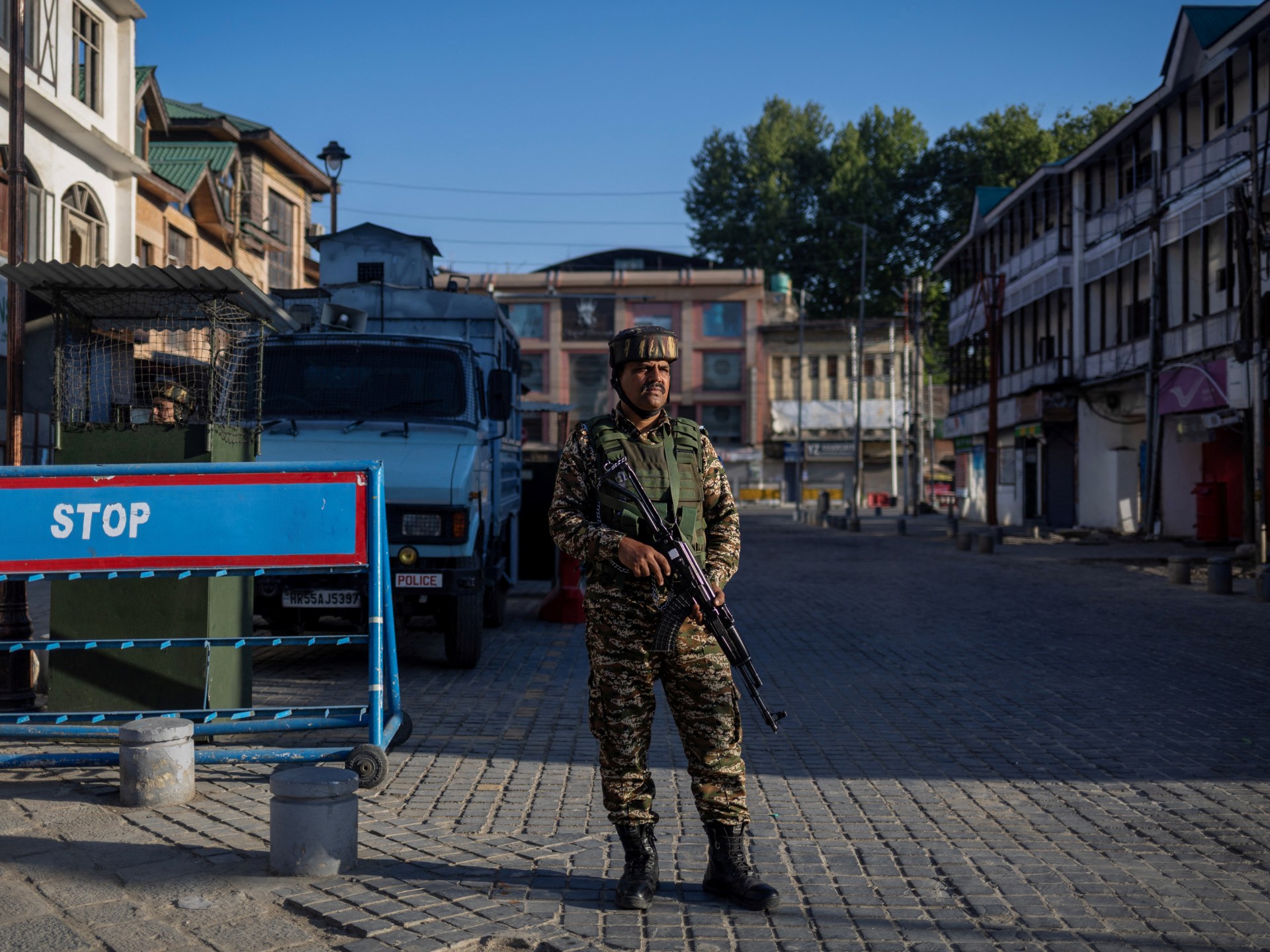
Diplomatic tit-for-tat and cross-border skirmishes are keeping fears of military escalation bubbling.
Tensions between India and Pakistan continue to simmer a week after a deadly attack in Indian-administered Kashmir.
Indian authorities announced the closure of numerous tourist sites in the region, which both countries have claimed since independence in 1947, on Tuesday, and Pakistan said it is preparing legal action over New Delhi’s punitive suspension of an important water treaty.
Meanwhile, fire was exchanged along the Line of Control (LoC), the 740km (460-mile) de facto border separating the Indian and Pakistani-controlled areas of Kashmir, for a fifth straight night. Pakistan said it had downed a drone, with fears of an escalation between the nuclear powers bubbling.
The government of Indian-administered Kashmir announced it had shut 48 out of 87 government-approved tourist destinations in the scenic Himalayan region.
No timeframe was given for the measure, as panic-stricken tourists sought an early exit.

Tit-for-tat
India has accused Pakistan of funding and encouraging “cross-border terrorism” in Muslim-majority Kashmir following last week’s gun attack targeting mostly Hindu tourists, in which 26 people were killed.
Islamabad denies any role and has called for a neutral inquiry.
A series of tit-for-tat diplomatic measures has followed, including the cancellation of visas and the recall of diplomats.
India has shut its border with Pakistan and banished Pakistani citizens. Pakistan has announced border and airspace closures and threatened to ditch the 1972 Simla Agreement that normalised relations to some extent between the two countries.
New Delhi also announced last week that it was suspending the Indus Waters Treaty, a 1960 agreement which feeds 80 percent of Pakistan’s irrigated agriculture.
بھارت کی جانب سے عائد کیے گئے الزامات بے بنیاد اور محض منفی پروپیگنڈے کا حصہ ہیں۔ بھارت کو دوسروں پر الزام تراشی سے پہلے اپنے داخلی مسائل کی اصلاح پر توجہ دینی چاہیے۔ سندھ طاس معاہدہ کسی صورت یکطرفہ طور پر معطل نہیں کیا جا سکتا۔ پاکستان عالمی بینک اور مستقل ثالثی عدالت سمیت تمام… pic.twitter.com/bMBeUMSJcq
— Barrister Aqeel Malik (@BrAqeelMalik) April 28, 2025
In Islamabad, Aqeel Malik, minister of state for law and justice, said on Tuesday Pakistan was planning to take legal action “at all available legal forums, including the World Bank and the Permanent Court of Arbitration”, to contest India’s move.
He told the Reuters news agency that Pakistan could also take its case to the International Court of Justice against what he called the violation of the 1960 Vienna Convention on the Law of Treaties by India.
‘Imminent’ military incursion
Meanwhile, firing continued for a fifth consecutive night along the LoC.
The Indian army said it had responded to “unprovoked” small arms fire from multiple Pakistani army posts around midnight. It gave no further details and reported no casualties.
Pakistan has not confirmed the exchange of fire, but state broadcaster Radio Pakistan reported that the military had shot down an unmanned Indian “quadcopter”, calling it a violation of its airspace.
The time of the incident was not reported. India has yet to comment.
Pakistan’s Defence Minister Khawaja Muhammad Asif told Reuters on Monday that his country was prepared for an “imminent” military incursion by India.
Conflict Zones
Sectarian clashes kill 13 near Syrian capital Damascus | Conflict News
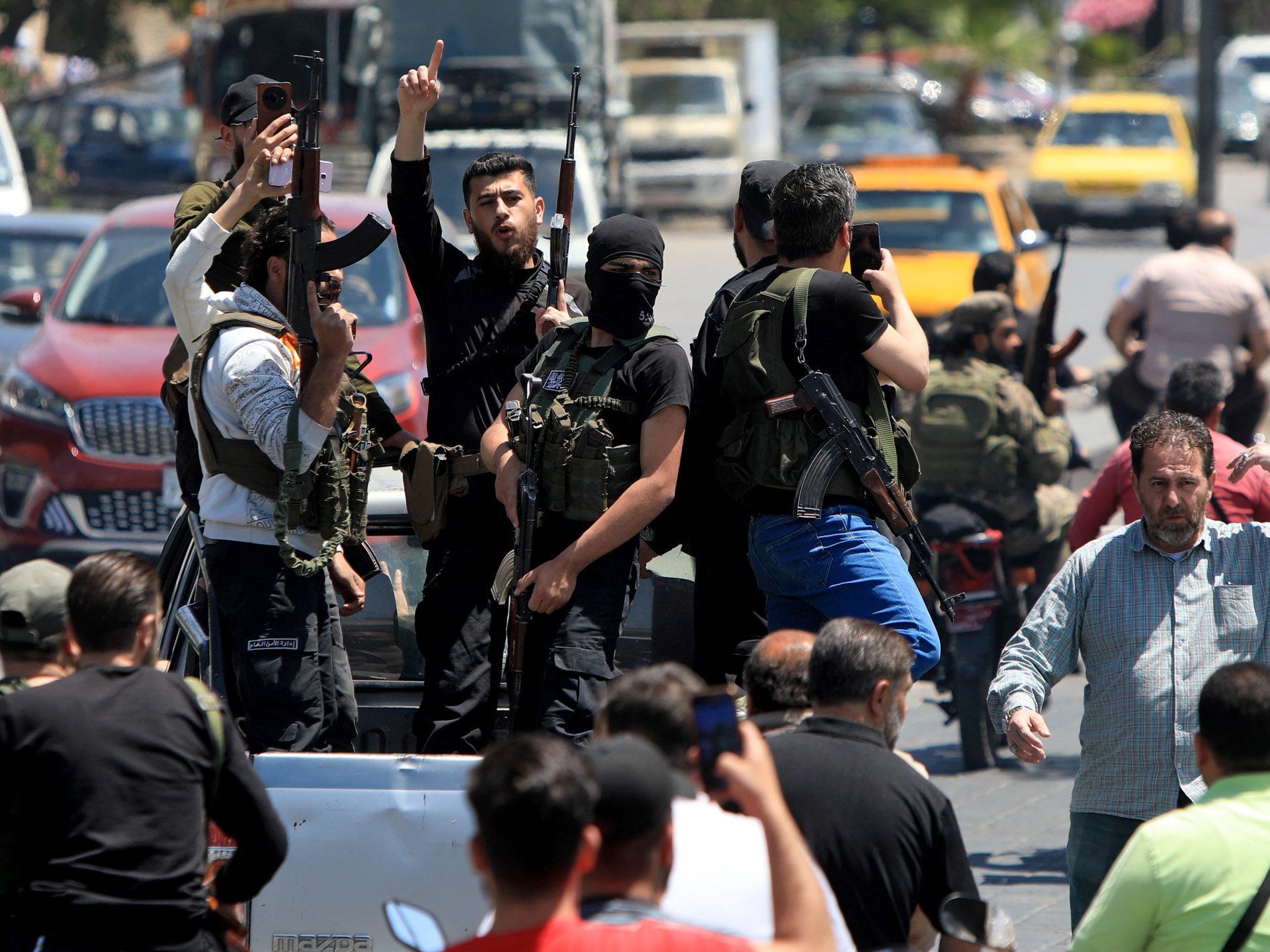
Druze elders meet security forces in a bid to prevent further escalation of deadly violence in the town of Jaramana.
Authorities in Syria have assured a thorough investigation into clashes that are reported to have killed 13 people in a town near the capital, Damascus, largely populated by the country’s Druze minority.
The Ministry of Interior said in a statement on Tuesday that it would pursue those involved in the sectarian violence.
Syria’s new rulers, rebels who led the rebellion that overthrew longtime ruler Bashar al-Assad in December, have struggled to maintain security for the country’s minorities, despite urging national unity and inclusivity.
The clashes were prompted overnight after an audio clip was circulated on social media attacking the Prophet Muhammad. The recording was attributed to a Druze leader.
Attackers from the nearby town of Maliha and other predominantly Sunni areas converged on the mostly Druze town of Jaramana.
The Interior Ministry reported casualties following “intermittent clashes between groups of gunmen”, adding that security forces “went to break up the clashes and protect the residents”.
“We affirm our keenness to pursue those involved and hold them to account,” it said in a statement.
Among those killed were two members of Syria’s General Security Service, a new security force comprised mostly of former rebels, according to ministry spokesman Mustafa al-Abdo.
Six Druze fighters from Jaramana and three “attackers” were also killed, according to the United Kingdom-based monitor Syrian Observatory for Human Rights.
A statement by the Druze community in Jaramana denounced the “unjustified armed attack” and condemned the audio recording, insisting it was fabricated “to incite sedition and sow division among the people of the same nation”.
“I categorically deny that the audio was made by me,” Druze leader Marwan Kiwan said in the video statement. “I did not say that, and whoever made it is an evil man who wants to incite strife between components of the Syrian people.”
The Interior Ministry said it was investigating the origin of the voice recording and appealed for calm.
Bloodshed
The clash only serves to increase the sectarian tension in Syria, with minorities already on edge following horrifying bloodshed last month.
After al-Assad loyalists from the Alawite community clashed with security forces in March, a wave of vigilante attacks killed hundreds of people in the northern areas of Tartous and Latakia governorates.
The nearly 14-year civil war that preceded al-Assad’s fall carved the country into various zones of influence, with the Druze – an Arab minority that practises a religion originally derived from Islam – arming themselves to defend their communities.
The new leadership in Damascus has called for all arms to fall under their authority, but Druze fighters have resisted, saying Damascus has failed to guarantee their protection from hostile armed groups.
Conflict Zones
Roadside bomb blast kills 26 in Nigeria’s restive northeast | Conflict News

Violence reportedly flaring up in region long plagued by ISIL affiliate in West Africa Province (ISWAP) and Boko Haram.
At least 26 people have been killed as a truck hit an improvised explosive device in Nigeria’s restive northeast.
The blast on Monday killed men, women and children in Borno State, near the border with Cameroon, according to the military and residents. The region has been plagued for decades by armed groups including the ISIL affiliate in West Africa Province (ISWAP) and Boko Haram, with violence flaring up in recent days.
“Twenty-six people died in the blast, comprising of 16 men, four women and six children,” a military officer speaking on condition of anonymity told the AFP news agency, adding that three further passengers were severely injured.
Borno State police offered no immediate comment.
The International NGO Safety Organisation, which provides security to foreign nongovernmental organisations in northeast Nigeria, said in an internal memo seen by the Reuters news agency that vehicles moving between the towns of Rann and Gamboru Ngala hit an IED.
“I took part in the funeral of the 26 people killed in the explosion; most of them were burned beyond recognition,” Akram Saad, a resident of the nearby town Rann, told AFP.
A video showed rows of bodies in white plastic bags laid on the floor of the morgue at Rann’s general hospital.
No one has claimed responsibility for the attack. But Abba Amma Muhammad, whose mother was killed, blamed the incident on Boko Haram.
Boko Haram’s uprising has plagued northeast Nigeria for the past 15 years, killing more than 40,000 people. The government has asserted that the groups are largely defeated, despite the persisting attacks.
ISWAP is also active in northern Borno and has launched sporadic ambushes on convoys and planted landmines along its highways.
The blast comes amid a flare-up of violence in northeast Nigeria in recent days, with the death toll rising to at least 50 people.
Boko Haram killed about 10 “vigilantes” from the Civilian Joint Task Force (CJTF) in the state of Adamawa, sources reported earlier on Monday, according to AFP.
On Thursday, the group killed 14 farmers in Borno’s Gwoza district, a local official said.
Borno State governor Babagana Umara Zulum on Friday told Nigeria’s defence minister and military chiefs that Boko Haram and ISWAP were entrenching themselves in Lake Chad islands, Sambisa Forest and Mandara mountains on the border with Cameroon as a result of “military setbacks”.
Conflict Zones
‘Traitors’: Hate-filled songs target Indian Muslims after Kashmir attack | Islamophobia News

Mumbai, India – Less than 24 hours after news broke of the April 22 attack, in which gunmen killed 25 tourists and a local pony rider in the Indian-administered Kashmir region, a new song surfaced on Indian YouTube.
Its message was unmistakable:
We made a mistake by allowing you to stay on,
You got your own country, why didn’t you leave then?
They call us Hindus “kaffirs”,
Their hearts are full of conspiracies against us.
The song, titled “Pehle Dharam Pocha” (They Asked About Religion First) targeted Indian Muslims, insisted they were conspiring against Hindus and asked them to leave India. In less than a week, the song has garnered more than 140,000 views on YouTube.
And it is not the only song. The killings in the picturesque resort town of Pahalgam marked the worst attack against tourists in Kashmir in a quarter of a century. But even as New Delhi hits back against Pakistan, which it accuses of links to the attack – a charge Islamabad denies – a wave of incendiary music tracks, crafted and circulated within hours, has set off an anti-Muslim backlash in India.
Set to pulsing beats and catchy rhymes, these songs, part of a genre that has come to be known as Hindutva Pop, are calling for violent retribution for the attack. From songs that label Indian Muslims as “traitors” to songs that advocate their boycott, the country’s smartphones are buzzing. Hindutva is the Hindu majoritarian political ideology of Prime Minister Narendra Modi’s governing Bharatiya Janata Party (BJP) and its allies.
Al Jazeera found at least 20 songs that carried and amplified such Islamophobic themes at a time when Indians were anxiously scrolling through their digital feeds for more information on the aftermath of the attack.
These songs have a chillingly consistent narrative: Since the attackers are believed to have singled out Hindu tourists, Indian Muslims can no longer be trusted – never mind that a Muslim Kashmiri pony rider who tried to stop the gunmen was also killed.
Apart from these, a glut of other hyper-nationalist songs has also emerged in the past week, pushing warmongering rhetoric deeper into Indian digital veins. There are songs that call for Pakistan to be nuked or for the Indian government to “wipe Pakistan off the map”, and others that advocate for “Pakistani blood” in exchange for the deaths,
These songs have become a part of a broader digital push by Hindutva groups, who are using social media and encrypted platforms like WhatsApp to stoke fear, hatred, and division among Indians – all at a time when tensions with neighbouring Pakistan are ratcheting up.
This campaign is mirroring real-world violence, across multiple Indian states. In Uttar Pradesh, Haryana, Maharashtra and Uttarakhand, Muslims have faced brutal attacks and threats. Kashmiri Muslims have been evicted from their homes, street vendors assaulted, and in chilling acts of retribution, Muslim patients have been denied medical care by Hindu doctors.
On Friday, a Muslim man was shot dead, with a Hindu supremacist in Agra, Uttar Pradesh, claiming responsibility for the shooting and saying it was retribution for the Pahalgam attack.
Concerted campaign
All the 20 songs that Al Jazeera analysed saw a common theme being pushed: a reiteration of the assertion that tourists were killed for their Hindu identities, and therefore, Hindus across the country must now feel threatened in living around Muslims. Multiple witness and survivor accounts of the Pahalgam attack suggest that the gunmen asked the tourists to recite the Kalimas (sacred Islamic verses) and the men who could not do so were shot.
The song Pehle Dharm Poocha (They Asked About Religion First) was released on April 23, the day after the attack. Singer Kavi Singh insists that letting Muslims stay on in India after the country’s partition in 1947 was “a mistake”, and asks them to go to Pakistan.
Another song, Ab Ek Nahi Huye Toh Kat Jaaoge (If You Don’t Unite Now You Will be Slaughtered), by singer Chandan Deewana, is addressed entirely to Hindus, asking them to rise up and “save our religion”. The song insists that Hindus, not Indians, are under threat and warns that they will be “slaughtered” if they do not unite. It has garnered more than 60,000 views on YouTube in just two days.
Jaago Hindu Jaago (Wake Up, Hindus) is a song that asks Hindus to identify “traitors within the country”, a coded reference to Muslims. The song’s video on YouTube contains an AI-re-enactment of the Pahalgam attack and has more than 128,000 views so far.
Another song, Modi Ji Ab Maha Yudh Ho Jaane Do (Modi ji, Let The Great War Begin), refers to Muslims as “snakes” living in India. Another song calls the events in the country a “religious war”, and yet another asks for Hindus in India to be allowed to carry arms.
These songs provide a background score for social media posts that bear similar themes.
From AI-generated videos and memes recreating the attack to Ghibli images, social media timelines have seen a flood of content emerging from the attack. Much of it carries similar undertones: to paint the attack as an assault on Hindus and the Hindu religion, while exhorting Hindus to “unite” against the threat of Muslims.
Some posts liken the Pahalgam killings to the October 7, 2023, attacks on Israel by Hamas and other Palestinian armed groups, and exhort the Indian government to “take revenge the Israel way”. Israel launched a war on the Gaza Strip that has, since October 2023, killed more than 52,000 Palestinians and wounded more than 117,000 others.
Raqib Hameed Naik, the executive director of the Washington, DC-based Center for the Study of Organized Hate (CSOH), which tracks hate speech in India, said the centre has observed “a sharp spike” in anti-Muslim rhetoric on social media since the Kashmir attack.
“The [Muslim] community is frequently portrayed as an existential threat through memes, AI-generated images, videos and misinformation, systematically designed to inflame passions and justify exclusionary rhetoric,” Naik said.
In addition to the 20 songs that Al Jazeera identified, there is a plethora of songs on YouTube abusing Pakistan (one song’s title is “Pakistan, You M***********”, and it has garnered more than 75,000 views). The videos accompanying some of these songs feature military simulation videos of air strikes, soldiers in combat and tanks firing munitions.
Some of them even feature the singers dressed in military fatigues and camouflage face paint, with one singer holding a rifle throughout the video.
Offline hate and violence
Since the Kashmir attack, there have been multiple incidents of violence on the streets, targeting Kashmiri and other Muslims across the country.
The Association For Protection Of Civil Rights (APCR), a civil rights advocacy group consisting of lawyers and human rights activists, has recorded 21 incidents of anti-Muslim violence, intimidation and hate speech across the country in the days after April 22.
These include assaulting Kashmiri women and students, delivering hate speeches against Muslims in public rallies and asking the Indian government to replicate Israel’s actions in Palestine against Kashmiris – as well as evicting Kashmiri students from their rented homes and hostels.
“Indians are being bombarded by this hateful campaign, which uses the attack as a base,” said Nadeem Khan, the general secretary of APCR. “This campaign has taken the country’s temperature to its boiling point.”
APCR, he said, was now in the process of arranging legal aid for victims of the post-attack violence.
Members of Modi’s BJP have been linked to some of the hate speech and violence.
One BJP minister in the western state of Maharashtra, Nitesh Rane, called for an economic boycott of Muslims, while addressing a public event attended by hundreds last week. “If they are behaving this way about religion, then why should we buy things from them and make them rich? You people will have to take a pledge that whenever you make any purchase, you should buy it only from a Hindu,” Rane told the gathering.
Another BJP legislator entered Jaipur city’s Jama Masjid and pasted offensive posters inside the premises of a mosque, during a protest against Pakistan for its involvement in the Kashmir attack. A group of BJP leaders in Mumbai were booked by the police for abusing and assaulting Muslim hawkers in central Mumbai.
In addition, leaders of the BJP as well as its ideological affiliates, the Bajrang Dal and the Vishwa Hindu Parishad, have also been organising protests against Pakistan, often indulging in anti-Muslim hate speeches in the process.
The Washington DC-based CSOH has recorded at least 10 hate speech events since April 22, where participants have threatened Muslims with violence, advocated for a boycott of Muslims, asked Hindus to arm themselves and even warned Kashmiri Muslims to leave, failing which they would “face consequences”.
Naik, from CSOH, said that the online hate campaign against Muslims had sought to “justify” this violence.
“This follows a longstanding pattern where certain domestic or international incidents are weaponised to demonise Muslims and promote hate and violence against them in India,” he said.
-

 Lifestyle2 days ago
Lifestyle2 days agoHow bugs and beet juice could play roles in the race to replace artificial dyes in food
-

 Middle East1 day ago
Middle East1 day agoDeadly US strike hits Yemeni migrant centre | Israel-Palestine conflict News
-
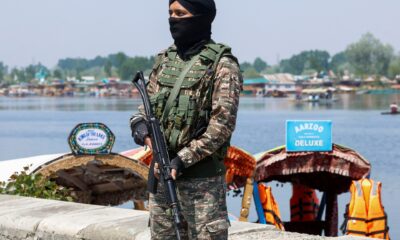
 Conflict Zones2 days ago
Conflict Zones2 days ago‘Burst balloon’: How Pahalgam attack shattered Modi’s Kashmir narrative | Narendra Modi News
-
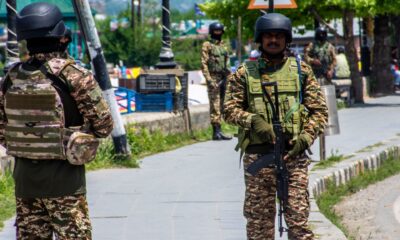
 Conflict Zones2 days ago
Conflict Zones2 days agoIndia and Pakistan continue to trade fire across Kashmir border | Conflict News
-

 Middle East1 day ago
Middle East1 day agoFires continue to rage at key Iran port as explosion death toll rises to 46 | Oil and Gas News
-

 Europe1 day ago
Europe1 day agoKim Kardashian armed robbery trial opens in Paris
-

 Sports1 day ago
Sports1 day agoMao Saigo: Japanese golfer celebrates Chevron Championship win by jumping in a pond
-
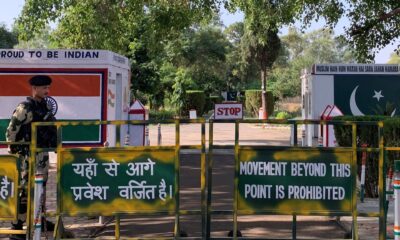
 Conflict Zones1 day ago
Conflict Zones1 day agoKashmir attack: Why Pakistan’s threat to suspend Simla Agreement matters | Conflict News




